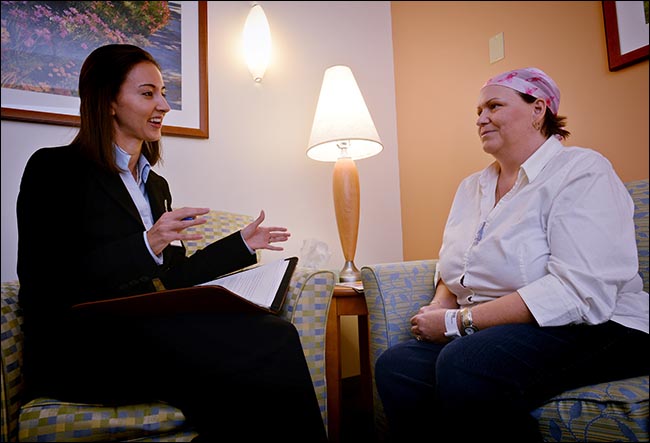The UNC Cancer Pro Bono Project allows law students, working under the supervision of volunteer attorneys, to draw up advance directives for cancer patients, for free. Originally designed as a joint program with Duke, Carolina’s student-run program has grown so much that it operates independently now, with the help of Legal Aid of North Carolina Inc. and about 35 volunteer attorneys.

By Susan Hudson, University Gazette
Chanda Holst of Autryville, a part-time special needs teacher, wife and mother of two, has enough to worry about.
The cancer diagnosed in her breast two years ago spread to her lymph nodes and then to her bones and her brain. She comes to Chapel Hill every two weeks for life-saving therapy at the UNC Lineberger Comprehensive Cancer Center, on this day sporting a pink head wrap decorated with the pink ribbons representing breast cancer awareness.
The last thing she needed was the hassle of going to a lawyer’s office to draw up a power of attorney or a living will, although she knew she should. She and her husband had been carrying around the paperwork ever since her first diagnosis.
Then one day in the waiting area outside the chemotherapy clinic, Holst saw a brochure for the UNC Cancer Pro Bono Project, a program that allows law students, working under the supervision of volunteer attorneys, to draw up advance directives for cancer patients, for free.
“Here, with it being so readily available, you can’t run away,” she said. So she contacted the students.
The law student who prepared Holst’s papers came right into the infusion room where she was hooked up to the tubes for chemotherapy, pulled the bed curtain shut for privacy and got started.
“I wonder how many people who sat around us were encouraged to complete their paperwork,” Holst said.
The law students and volunteer attorneys process about 30 documents a month at clinics held the second and fourth Fridays outside of the Patient and Family Resource Center within the N.C. Cancer Hospital. They meet with cancer patients and their families there to talk about legal documents the patients often need: financial powers of attorney, health-care powers of attorney and living wills.
The patients provide instructions about how they want their financial and health care affairs to be handled, the law students draft the legal documents and the volunteer lawyers review the work. The papers are signed and notarized on site, and the patients leave the hospital with legal documents, but no bill for them.
“When you’re finished, you don’t have to worry about it any more,” said Brandon Holst, Chanda’s husband.
